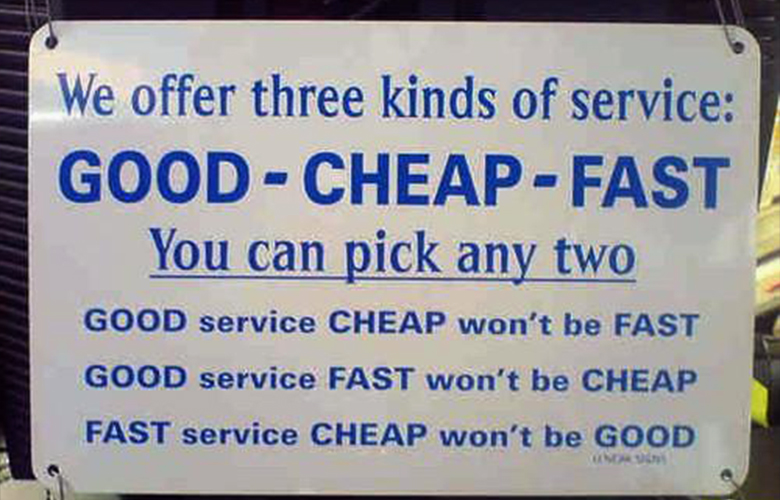
You may have seen those ads on job boards. You know the ones. “Low/no pay,” “micro-budget,” “volunteer,” “passion project, no one is getting paid.” You may think, “Who would work for free? Who are the people taking these jobs?”
Competition is high in audio/creative industries and competing against many other people for the same job is a regular occurrence in the freelance world. Unfortunately, our first compromise is usually financial. There are those who are so hungry for work and experience that they will do it for low/no pay. And there are others simply willing to do a favour.
Of course, if you are in a position where you would consider working for free – the apparent upsides may outweigh everything else. Your first thought may be that this experience will lead to future, paid work from this client. Sure, it could but don’t base your decision solely on that unknown. You are not guaranteed paying jobs from that client in the future, and it is more likely they will keep coming back to you for free work.

For many students/recent graduates, that unpaid internship may look like your way into the industry, but you must be cautious as you can easily be taken advantage of. Here in Ontario, the only legal way employers can hire unpaid interns is if said intern “performs work under a program approved by a college of applied arts and technology or a university, or under a program approved by a private career college.” That being said, unpaid internships have been the norm for many years. There are some unpaid internships where you may be expected to do the work of a paid employee – this is where you will be taken advantage of. Internships can be an amazing experience, and a jump start to your career. Keep in mind though; you are not guaranteed a job at the end, so make sure you put as much into it as you get out of it.
We now reach this conundrum; if you are someone without much experience in the field, you will find it hard to get paying work. You want to work and need the experience, but you also don’t want to work for free, potentially devaluing yourself and the industry. Are there ways you can take on low/no pay work successfully?
My personal rule of thumb for doing free/low pay work is to make sure I’m getting something out of it too. Whether that is a non-monetary payment such as baked goods or a killer mixtape, or a trade of services. I think it is important to receive something in return for your work so that the client understands that your time and experience has value. At the very least, make sure you establish an agreement that allows you to keep your work and use the project for your personal reel, etc. If I ever take on a job for free, it can be a fine balance to negotiate paid work in my schedule as well. It is important to establish expectations like deliverables and deadlines first so that you are in control of prioritizing paid work.
Working for free is a very polarizing subject. Even in speaking to friends and colleagues while writing this blog, I found we all had slightly different opinions. Have you done work for free? Would you again?
7 Sound Alternatives to Working for Free
10 Reasons to Volunteer Your Time or Work for Free
An Open Letter to Mental Health


The mission of SoundGirls.org is to inspire and empower the next generation of women in audio. Our mission is to create a supportive community for women in audio and music production, providing the tools, knowledge, and support to further their careers. SoundGirls.Org was formed in 2013 by veteran live sound engineers Karrie Keyes and Michelle Sabolchick Pettinato and operates under the Fiscal Sponsorship of The California Women’s Music Festival, a 501(c)3 non-profit organization. In 2012, Karrie and Michelle participated in the “Women of Professional Concert Sound” panel at the AES Conference in San Francisco. The panel was hosted by the Women’s Audio Mission (WAM) and moderated by WAM founder Terri Winston. Terri brought together five women working in live and broadcast audio. The groundbreaking panel (which also included Jeri Palumbo, Claudia Engelhart and Deanne Franklin), provided young women and men a glimpse into life on the road, tips and advice, and a Q & A with the panelists. More importantly though, was how incredibly powerful the experience was for the panelists. We had all been in the business for 20 years or more, yet most of us had never met before that day and within minutes we bonded like long-lost sisters. We were struck by how similar our experiences, work ethics, and passions were and wondered why our paths had never crossed and how our careers would have been different had we been there to support each other through the years. Each of us are strong on our own, but together we were even stronger and a powerful force. We were empowered. Each of us had been asked hundreds of times in our careers: Are there other women doing sound? How did you get into sound? How would a young woman go about getting into sound? Through creating SoundGirls.Org, we hope to establish a place for women working in professional audio to come for support and advice, to share our success and failures, our joys and frustrations, and for empowerment and inspiration.
Read Full Profile© 2021 TheatreArtLife. All rights reserved.

Thank you so much for reading, but you have now reached your free article limit for this month.
Our contributors are currently writing more articles for you to enjoy.
To keep reading, all you have to do is become a subscriber and then you can read unlimited articles anytime.
Your investment will help us continue to ignite connections across the globe in live entertainment and build this community for industry professionals.